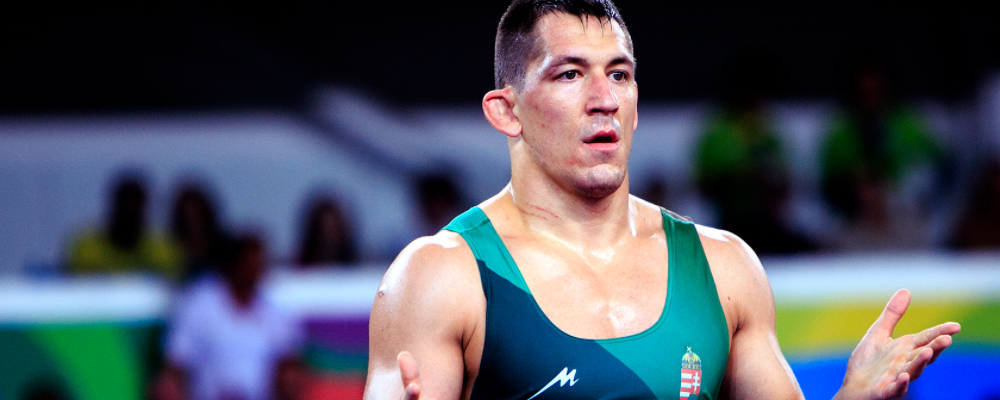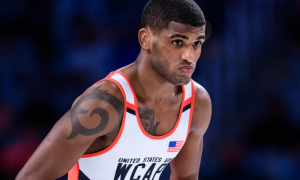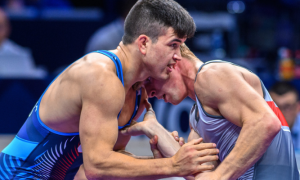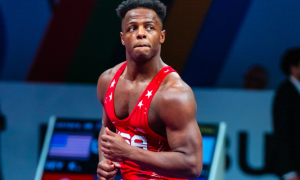85 kilograms is a young man’s weight class, as the ten presumed top competitors here come in at an average of 24.5 years old. It speaks to the current climate of Greco-Roman wrestling at the Senior level. Cadets and Juniors who experienced success have been able to keep the ball rolling when they move up. Some of that has to do with the incredible talent present in this bracket and elsewhere, and some of it has to do with the fact that the age-groupers were already well-accustomed to the par terre-less rule-set that hit the Seniors last fall.
Reigning Olympic gold medalist Davit Chakvetadze (RUS, world no. 4) is actually not the first seed. That distinction belongs to Hungary’s steady locomotive known as Viktor Lorincz (world no. 1). Lorincz took out Chakvetadze last year in the finals of the Grand Prix of Spain before the Russian got him back (and then some) in Rio. They met again in 2017 at Poland’s Pytlasinski Cup, which was another Lorincz victory. With Chakvetadze as the #3 seed, it’s possible they could be on another collision course, but there are far too many beasts here to where that is any way a given.
For the US, it’s “Big Ben” — Ben Provisor (NYAC). The two-time Olympian was magnificent at the World Team Trials in late-April, surviving one of the deepest domestic brackets in over a decade. Provisor will be taking the mat for the first time ever at a Senior World Championships, an oddity of sorts considering he has already been to two Olympiads. He is also not here as bracket filler. The furthest thing from it. Provisor’s strength, experience, and bullish approach rank up there with the most high-profile athletes who will be in Paris, and he just might have the steam required to make a very, very serious run at this thing.
2017 Greco-Roman World Championships: 85 kg
Davit Chakvetadze — RUS, world no. 4 (2016 Olympic gold medalist, 2015 European Games gold medalist, 2016 Russian Nationals gold medalist, 2017 Ivan Poddubny Tournament gold medalist)
Chakvetadze is, of course, seen as the favorite by most observers. That comes with being the reigning Olympic champ. It’s also not ignorance. The guy is a fantastic Greco-Roman wrestler. However, Chakvetadze has found life without forced par terre more challenging than he perhaps expected, so a little of the mystique he had working for him is no longer there. A stunning upset at the hands of Dejan Frankjkovic (SRB) in the first round of the Euros really set him back, for a placing at that event would have certainly meant a first seed here. Most recently, Viktor Lorincz (listed below) controlled Chakvetadze in the finals of the Pytlasinski Cup and those two have some history between them. Lorincz defeated the Russian at the 2016 Spanish Grand Prix before Chakvetadze got him back in the Rio semis. Enough about that. We all know the deal. Assuming he’s properly prepared, motivated, and ready to roll, you should expect to see this guy competing for a medal Monday afternoon.
Viktor Lorincz — HUN, world no. 1 (Two-time World bronze medalist, 2017 European Championships gold medalist, 2012 Golden Grand Prix gold medalist)
At 27, Lorincz is really beginning to hit his stride, which is saying something for a man who has been an excellent Senior competitor for as long as he has. Forget the World bronze performances — they’re relevant, but they don’t speak to what he’s done lately. Lorincz has dropped precisely one match thus far in 2017 — to Robert Kobliashvili (listed at the bottom) in the semifinals of the Tbilisi Grand Prix. It was a home field advantage victory for Kobliashvili, but that’s how it is. Other than that, Lorincz has won everything, including the Euros, where he edged Nikolai Bayrakov (see below) in a thrilling semifinal bout before taking out Metehan Basar (also listed below, see a pattern here?) in the finals. There is no secret formula as to why the Hungarian is winning so much. He works hard every second of every match and is rarely beaten out of position. This figures to be a trend that will continue in Paris.
Nikolai Bayrakov — BUL, world no. 2 (2016 Olympian, 2017 European Championships bronze medalist)
Bayrakov doesn’t get enough credit for his smoothness. Check this guy out in the ties. He hand-fights with a flow. Rolls his shoulders, switches off lead legs, and always seems to know where he needs to be. Bayrakov would likely find more opportunities if he wasn’t so…pushy. He pushes off a little too much, which appears to disrupt his own rhythm. Bayrakov won a match in Rio and then had the brakes beaten off of him by eventual silver Zhan Belenyuk (UKR, world no. 10). A loss to Javid Hamzatau (BLR) in the bronze medal match wound up being a bummer, but he’s performed well since then. Bayrakov has three bronzes in 2017, the last of which he earned at the Euros after a close semifinal defeat to Lorincz.
Zakarias Berg — SWE, world no. 8 (2016 Olympian, 2015 Junior World bronze medalist, 2013 Cadet World bronze medalist, 2017 U23 European Championships gold medalist, 2016 U23 European Championships bronze medalist)
The Paris World Championships is probably not supposed to represent Berg’s breakout, though it could. He has steadily improved as a Senior and is showing more authoritativeness. That’s a big thing for successful age groupers. Talented ex-Juniors like Berg can sometimes take a minute before they are confident that what worked before can also prove effective against more experienced foes. He just can’t be timid, especially when he gets his chance with an underhook. Berg can twist and lock with the best of them if he’s confident enough. There is some background here that matters, such as a loss to Rio bronze Denis Kudla (GER, world no. 7, listed below) at Thor Masters in March he revenged in the semifinals of the U23 Euros. It’s not weird to say it — Berg may have something here and could end up fighting for the spotlight.
Islam Abbasov — AZE, world no. 3 (2014 Junior World Champion, 2015 Junior World silver medalist, two-time Cadet World Champion, 2016 World Military Championships silver medalist, 2017 Islamic Solidarity Games gold medalist)
Another top-flight Junior competitor, Abbasov is beginning to come into his own more and more. He’s got a couple of tools that opponents should pay attention to. His two-on-one is a vice. Abbasov clamps the tie-up very tightly and likes to lift it up and pressure it deep into the body. From there, he has an assortment of finishes — drags to bodylocks, he can get to side for a lift, force it down for a high dive…it’s a multifaceted proposition for him. The one glaring issue Abbasov has is that he can be knocked off balance just a little too often for someone as good as he is. This has resulted in some points going the other way, which we saw at the World Cup. That being said, he has been extremely strong lately and is carrying enough capital to be seen as a contender.
Denis Kudla — GER, world no. 7 (2016 Olympic bronze medalist, 2014 Junior World silver medalist, 2015 U23 European Championships gold medalist, 2017 European Championships bronze medalist)
Kudla picked up right where he left off following his sparkling run to bronze in Rio, though he has been outworked a couple of times in recent months, first by Berg at the Euros and then by Lorincz at the Pytlasinski Cup. He doesn’t fall asleep at the wheel — Kudla always delivers effort. But he would probably do well to show the officials that activity is his priority. He’s patient, but like some others at this tournament, there’s a limit to how long of a leash that comes with. The first-ever U23 European Championships winner in 2015, Kudla impressed even more with his bronze at the Senior event a year later. His game hasn’t slipped without par terre involved, but as mentioned, a slight jump in urgency wouldn’t hurt. He’s got a big following in Germany and will look to give that country its first title since Frank Staebler (71 kg, world no. 6) delivered gold two years ago in Vegas.
Zhan Belenyuk — UKR, world no. 10 (2016 Olympic silver medalist, 2015 World Champion, 2016 European Championships gold medalist, 2011 Junior World silver medalist, 2010 World bronze medalist)
Obviously, par terre, or lack thereof, has been a constant theme in these previews, but there is a very good reason for that. Many wrestlers relied on having their chances from top so much that once it was taken away, their results suffered. Count Belenyuk among that group. Points-per-match for the Ukrainian have dropped off the table. What’s odd about that is Belenyuk was reasonably active on the feet before the rule change, specifically against lesser opposition. It isn’t as if he was always hanging back waiting for his shot on top. But he was a complete hammer with his offense from the position and since that don’t come free anymore, his game has taken a very big hit. It doesn’t mean he’s still not a major player in this bracket. Belenyuk has already been a World Champion, for crying out loud. Even still, it’ll be very interesting to see what kind of adjustments he’s made over the last bunch of months.
TEAM USA: Ben Provisor (Two-time Olympian, two-time Dave Schultz Memorial gold medalist, 2017 Pan Am Championships gold medalist, 2017 Tbilisi Grand Prix silver medalist)
Why waste any time? YES — Provisor is a very real problem for everyone at 85 kilograms to the point where he should absolutely be expected to be in the hunt for a medal. And that is not meant as some pretentious “hot take.”
Forget the draw, which for him will not be terrific. He’s got a great chance of being matched up in the qualification round with one of the names on this list. That shouldn’t matter so much. The leaps Provisor has made over the last two years are indicative of more than just a wrestler waltzing into his prime. The athletic side of his continued development is important, for sure, but it isn’t everything. Provisor skyrocketed to the 2012 Olympic Team before his 22nd birthday and from then on, endured a whole laundry list of life-changing experiences. His body was already beginning to become uncooperative, there were numerous injuries, he got married, had a kid, was injured some more, relocated from Colorado Springs back to Wisconsin, and then returned in a flourish to make the squad for the Rio Games. It’s a lot to go through.
Part of his resurgence in 2016 had to do with healing, in every sense of the word. The remaking of his body arrived in-sync with newfound peace off the mat. One has to feed the other, lest the package remain incomplete. It’s not that he calmed down so much. After all, this is Provisor we’re talking about. He says what he wants, does what he wants. He’s very much his own man. But maturity is a funny thing. You can say you’ve got it, but if you do, chances are it’s still eluding you. Provisor didn’t talk about becoming more mature. He just went out there and competed with a different air of confidence about him and in this walk of life, that’s what people tend to notice the most.
Back to the mat — Provisor dropped his only match in Rio to 2015 World bronze medalist Rustam Assakalov (UZB) and it was as frustrating of a loss as you could imagine. Assakalov won because he turned the American. That’s really it. Provisor was a beast in every other area, but he could not translate his dominating ways into points. His next time out was the US Open in December, where Khymba Johnson (NYAC-OTS) upset him in a lackluster semifinal. Provisor hung in there for third, but this event was an overall wash. He hadn’t been training and although he still managed to rebound for third, it’s a performance that should probably be dismissed.
The Dave Schultz Memorial in February resulted in Provisor picking up his second career gold at that tournament. A month later, a large delegation of US Senior athletes went over to Europe for some training and a trio of events. Provisor competed in two of them, taking seventh and fifth at Thor Masters and the Grand Prix of Zagreb Open, respectively. At the Zagreb, Lorincz defeated “Big Ben” on a pair of passivity points, notable only because Provisor was still reeling from an illness he came down with the week before.
As with all of the US guys, the trip over to Europe was largely seen as a means of preparation for the World Team Trials, an event Provisor had never won. The task at hand in Las Vegas was anything but easy. 85 kilograms at the Trials offered what was perhaps the deepest bracket of any weight at the tournament throughout the past decade. Along with Provisor were 2014 World Team member and 12016 Olympic Trials winner Joe Rau (Minnesota Storm); two-time World Team member Patrick Martinez (NYAC); four-time Trials finalist Jon Anderson (Army/WCAP); reigning National champ Kevin Radford (Sunkist); and former Junior World Team member Lucas Sheridan (Army/WCAP). Quite the haul.
Provisor gritted out a tough 5-0 win over Sheridan to start his day. Waiting for him in the semifinals was Martinez. The two had met in the quarters of the 2016 Olympic Trials, a 4-0 win for Provisor. This time around, Martinez closed the gap but still fell 2-1 on a passivity point. In the finals, Rau brought the heat as best he could, but Provisor managed to stay a step ahead in the crucial moments of both matches, a late takedown in the second bout sealing his spot on this team.
The next week in Brazil, Provisor, along with Patrick Smith (71 kg, Minnesota Storm) and Cheney Haight (80 kg, NYAC), cruised to his first Pan Am Championships gold. A month after that was the Tbilisi Grand Prix. With the US Seniors smack dab in the middle of their training phase for the World Championships, Tbilisi was equal parts practice event and litmus test. Results took a backseat to actual progress and performance for the squad as a whole, but for Provisor, the tournament carried some meaning. That’s because in the 85 kilogram final, he locked up with 2016 European Championships runner-up Kobliashvili, who is considered to be among the elite competitors at this weight in the world. Provisor tried to bruise and bully his way to victory, not an easy task against someone of Kobliashvili’s caliber. But he found himself right in the thick of it all the way through, falling short 2-0 to the Georgian, with both points coming via passivity.
A two-time Olympic Team member, almost by default, deserves to be acknowledged as a World-level threat. However, Provisor is more than that. He has proven enough times in the past and even more so recently that he is on par with some of the bigger names here. That doesn’t guarantee victory on its own, of course. It is going to be a grueling road for the Wisconsinite should he be able to advance later on in the tournament. But if he does, it won’t be some gigantic shock.
At 27, Provisor presents many more issues for opponents than he ever did before. His power is considerable and make no mistake about it, Greco can be as much about power as it is technique. The advantage Provisor wields with his strength is that it comes at you in a menacing, compact package. He’s short and he’s stout, and because of this, lankier foes have a very difficult time keeping him out of their kitchens. There’s also that underhook, the right one. Provisor throws it so violently, it looks like an uppercut. He’s not weaving those hooks in from the pummel nearly as often as when he prowls forward and knifes that thing towards his opponents’ ribcages. To compliment this tool of his, he has also developed a startling high dive that presents itself from a number of angles, and it could wind up being a very useful weapon for him in the right situation against the right guy. From top, Provisor has an excellent gutwrench — that is definitely his go-to more so than a lift. And defensively, his body is so dense that all he really needs to do is commit to bottoming-out and he can guard against most turns.
Does this all add up to a Provisor medal? It very well could. There are several American athletes taking the mat in Paris who have everything clicking in the right direction and that’s where this guy is at. You do not have to worry about a lack of confidence or the prospect of Provisor somehow being intimidated by the bright lights. Those two Olympic teams have taken care of that. He knows what to expect and more importantly, believes he has it in him to do this. Why should anyone else doubt him then? The past 28 months have brought about a version of Ben Provisor that is motivated, mature, and extremely dangerous. Assume that’s the version we’ll see on Monday. If it is, there might be a party in Wisconsin later on that night.
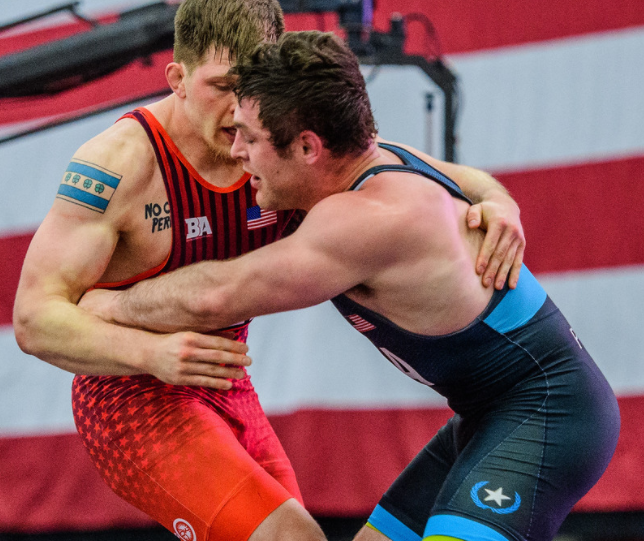
Provisor (blue) looks to attack Joe Rau’s body during the finals of the 2017 US World Team Trials. (Photo: Tony Rotundo)
ALSO IN THE RUNNING:
Metehan Basar — TUR, world no. 5 (2011 Junior World bronze medalist, 2014 University World Champion, 2017 European Championships silver medalist, 2015 European Games bronze medalist)
A terrific display of gutsiness at the European Championships has launched Basar into the mix as a favorite in this bracket. Without that Euros run, his outlook would have been dicier. He enjoyed a great draw in Serbia and made the most of it, advancing to the finals where he gave Lorincz a hard time in the tie-ups.
Robert Kobliashvili — GEO, world no. 6 (2016 Olympian, 2014 Golden Grand Prix gold medalist, 2016 European Championships silver medalist, 2017 Tbilisi Grand Prix gold medalist)
An iron-willed wrestler who simply refuses to ever back down an inch, Kobliashvili possess a great gas tank and is more than adept at making opponents pay for not being able to keep up with him. If you’re someone who observes perceived trajectories, then a knockout showing by Kobliashvili definitely shouldn’t come as a surprise.
2017 Greco-Roman World Championships
AccorHotels Arena, Paris, France
Monday, August 21st — 71 kg, 75 kg, 85 kg, 98 kg
Tuesday, August 22nd — 59 kg, 66 kg, 80 kg, 130 kg
Live streaming available in the United States on Trackwrestling.com
SUBSCRIBE TO THE FIVE POINT MOVE PODCAST
iTunes | Stitcher | Spreaker | Google Play Music | RSS

Notice: Trying to get property 'term_id' of non-object in /home/fivepointwp/webapps/fivepointwp/wp-content/themes/flex-mag/functions.php on line 999

